Exploitation Under Colonialism: Vietnam and Philippines Compared
VerifiedAdded on 2023/04/20
|6
|1612
|124
Essay
AI Summary
This essay examines the historical context of colonial exploitation in Vietnam and the Philippines, focusing on the impact of French, Spanish, and American colonialism. It explores the economic exploitation of resources and labor, the imposition of political control, and the lasting effects on both societies. The essay analyzes how colonialism affected different classes and genders, highlighting the shift in social and economic roles. It discusses the motivations behind colonial expansion, the methods used to extract resources, and the consequences for the colonized populations. The essay draws on various sources to provide a comprehensive overview of the topic, concluding that colonialism primarily served the interests of the colonizers, often at the expense of the colonized countries. The essay is a valuable resource for students studying history, political science, and related fields, available on Desklib.
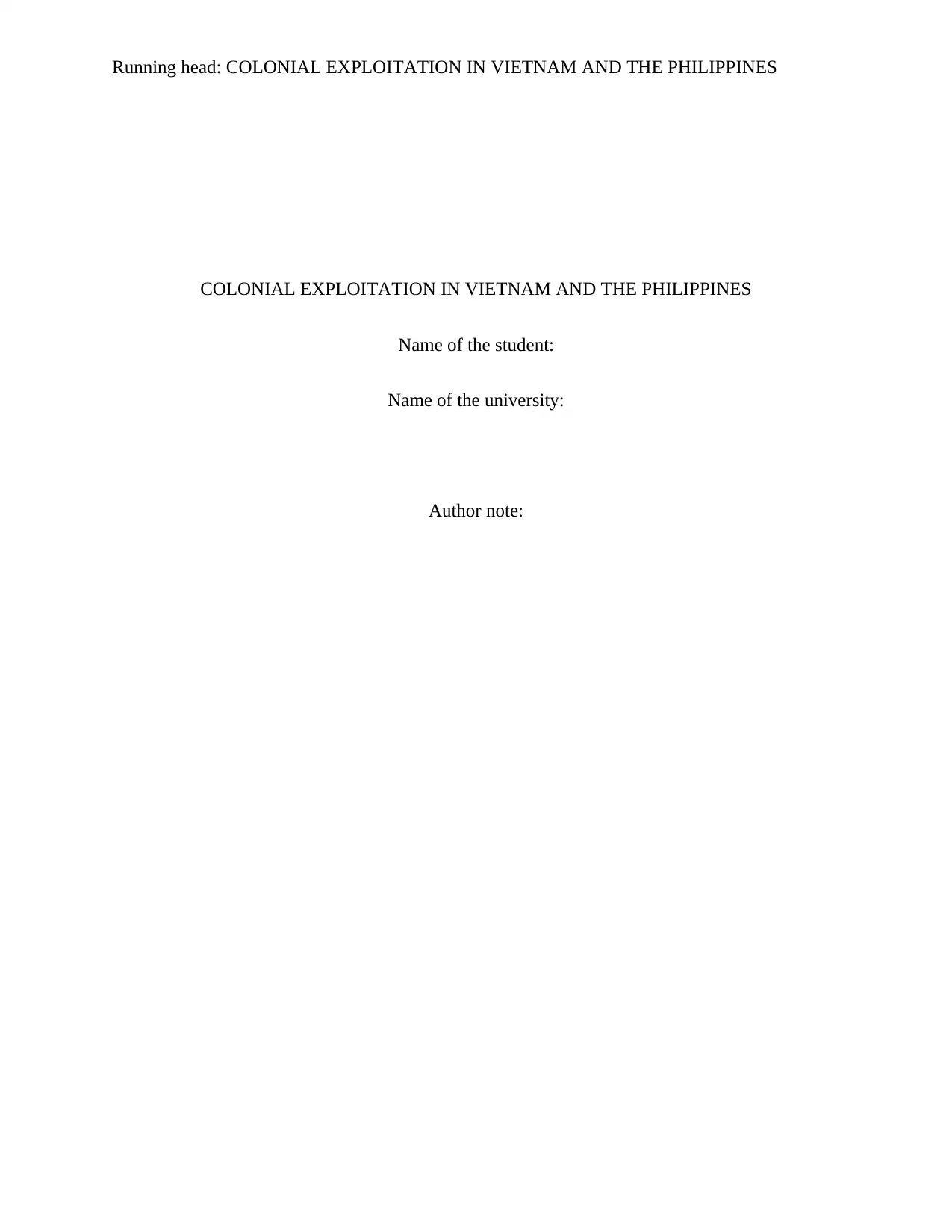
Running head: COLONIAL EXPLOITATION IN VIETNAM AND THE PHILIPPINES
COLONIAL EXPLOITATION IN VIETNAM AND THE PHILIPPINES
Name of the student:
Name of the university:
Author note:
COLONIAL EXPLOITATION IN VIETNAM AND THE PHILIPPINES
Name of the student:
Name of the university:
Author note:
Paraphrase This Document
Need a fresh take? Get an instant paraphrase of this document with our AI Paraphraser
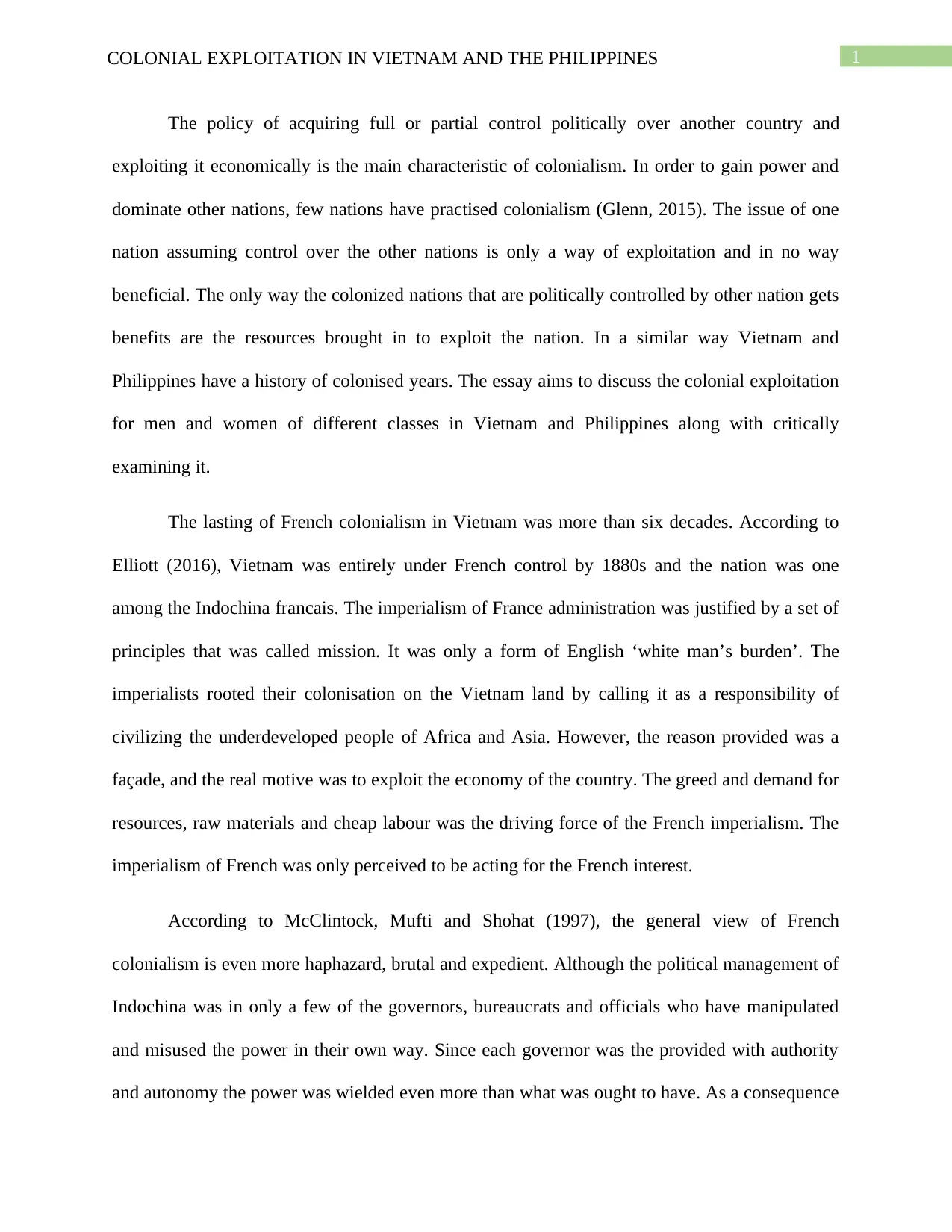
1COLONIAL EXPLOITATION IN VIETNAM AND THE PHILIPPINES
The policy of acquiring full or partial control politically over another country and
exploiting it economically is the main characteristic of colonialism. In order to gain power and
dominate other nations, few nations have practised colonialism (Glenn, 2015). The issue of one
nation assuming control over the other nations is only a way of exploitation and in no way
beneficial. The only way the colonized nations that are politically controlled by other nation gets
benefits are the resources brought in to exploit the nation. In a similar way Vietnam and
Philippines have a history of colonised years. The essay aims to discuss the colonial exploitation
for men and women of different classes in Vietnam and Philippines along with critically
examining it.
The lasting of French colonialism in Vietnam was more than six decades. According to
Elliott (2016), Vietnam was entirely under French control by 1880s and the nation was one
among the Indochina francais. The imperialism of France administration was justified by a set of
principles that was called mission. It was only a form of English ‘white man’s burden’. The
imperialists rooted their colonisation on the Vietnam land by calling it as a responsibility of
civilizing the underdeveloped people of Africa and Asia. However, the reason provided was a
façade, and the real motive was to exploit the economy of the country. The greed and demand for
resources, raw materials and cheap labour was the driving force of the French imperialism. The
imperialism of French was only perceived to be acting for the French interest.
According to McClintock, Mufti and Shohat (1997), the general view of French
colonialism is even more haphazard, brutal and expedient. Although the political management of
Indochina was in only a few of the governors, bureaucrats and officials who have manipulated
and misused the power in their own way. Since each governor was the provided with authority
and autonomy the power was wielded even more than what was ought to have. As a consequence
The policy of acquiring full or partial control politically over another country and
exploiting it economically is the main characteristic of colonialism. In order to gain power and
dominate other nations, few nations have practised colonialism (Glenn, 2015). The issue of one
nation assuming control over the other nations is only a way of exploitation and in no way
beneficial. The only way the colonized nations that are politically controlled by other nation gets
benefits are the resources brought in to exploit the nation. In a similar way Vietnam and
Philippines have a history of colonised years. The essay aims to discuss the colonial exploitation
for men and women of different classes in Vietnam and Philippines along with critically
examining it.
The lasting of French colonialism in Vietnam was more than six decades. According to
Elliott (2016), Vietnam was entirely under French control by 1880s and the nation was one
among the Indochina francais. The imperialism of France administration was justified by a set of
principles that was called mission. It was only a form of English ‘white man’s burden’. The
imperialists rooted their colonisation on the Vietnam land by calling it as a responsibility of
civilizing the underdeveloped people of Africa and Asia. However, the reason provided was a
façade, and the real motive was to exploit the economy of the country. The greed and demand for
resources, raw materials and cheap labour was the driving force of the French imperialism. The
imperialism of French was only perceived to be acting for the French interest.
According to McClintock, Mufti and Shohat (1997), the general view of French
colonialism is even more haphazard, brutal and expedient. Although the political management of
Indochina was in only a few of the governors, bureaucrats and officials who have manipulated
and misused the power in their own way. Since each governor was the provided with authority
and autonomy the power was wielded even more than what was ought to have. As a consequence
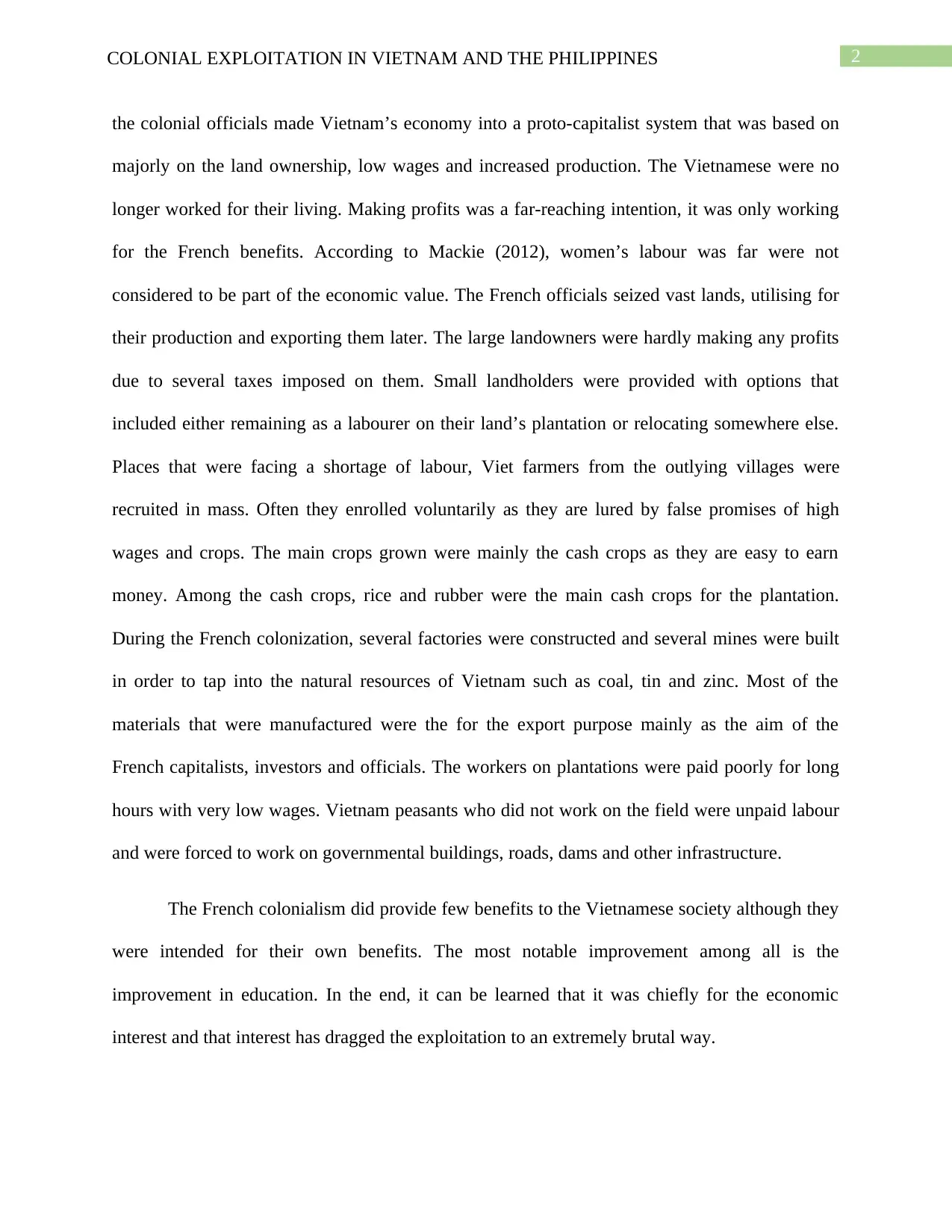
2COLONIAL EXPLOITATION IN VIETNAM AND THE PHILIPPINES
the colonial officials made Vietnam’s economy into a proto-capitalist system that was based on
majorly on the land ownership, low wages and increased production. The Vietnamese were no
longer worked for their living. Making profits was a far-reaching intention, it was only working
for the French benefits. According to Mackie (2012), women’s labour was far were not
considered to be part of the economic value. The French officials seized vast lands, utilising for
their production and exporting them later. The large landowners were hardly making any profits
due to several taxes imposed on them. Small landholders were provided with options that
included either remaining as a labourer on their land’s plantation or relocating somewhere else.
Places that were facing a shortage of labour, Viet farmers from the outlying villages were
recruited in mass. Often they enrolled voluntarily as they are lured by false promises of high
wages and crops. The main crops grown were mainly the cash crops as they are easy to earn
money. Among the cash crops, rice and rubber were the main cash crops for the plantation.
During the French colonization, several factories were constructed and several mines were built
in order to tap into the natural resources of Vietnam such as coal, tin and zinc. Most of the
materials that were manufactured were the for the export purpose mainly as the aim of the
French capitalists, investors and officials. The workers on plantations were paid poorly for long
hours with very low wages. Vietnam peasants who did not work on the field were unpaid labour
and were forced to work on governmental buildings, roads, dams and other infrastructure.
The French colonialism did provide few benefits to the Vietnamese society although they
were intended for their own benefits. The most notable improvement among all is the
improvement in education. In the end, it can be learned that it was chiefly for the economic
interest and that interest has dragged the exploitation to an extremely brutal way.
the colonial officials made Vietnam’s economy into a proto-capitalist system that was based on
majorly on the land ownership, low wages and increased production. The Vietnamese were no
longer worked for their living. Making profits was a far-reaching intention, it was only working
for the French benefits. According to Mackie (2012), women’s labour was far were not
considered to be part of the economic value. The French officials seized vast lands, utilising for
their production and exporting them later. The large landowners were hardly making any profits
due to several taxes imposed on them. Small landholders were provided with options that
included either remaining as a labourer on their land’s plantation or relocating somewhere else.
Places that were facing a shortage of labour, Viet farmers from the outlying villages were
recruited in mass. Often they enrolled voluntarily as they are lured by false promises of high
wages and crops. The main crops grown were mainly the cash crops as they are easy to earn
money. Among the cash crops, rice and rubber were the main cash crops for the plantation.
During the French colonization, several factories were constructed and several mines were built
in order to tap into the natural resources of Vietnam such as coal, tin and zinc. Most of the
materials that were manufactured were the for the export purpose mainly as the aim of the
French capitalists, investors and officials. The workers on plantations were paid poorly for long
hours with very low wages. Vietnam peasants who did not work on the field were unpaid labour
and were forced to work on governmental buildings, roads, dams and other infrastructure.
The French colonialism did provide few benefits to the Vietnamese society although they
were intended for their own benefits. The most notable improvement among all is the
improvement in education. In the end, it can be learned that it was chiefly for the economic
interest and that interest has dragged the exploitation to an extremely brutal way.
⊘ This is a preview!⊘
Do you want full access?
Subscribe today to unlock all pages.

Trusted by 1+ million students worldwide
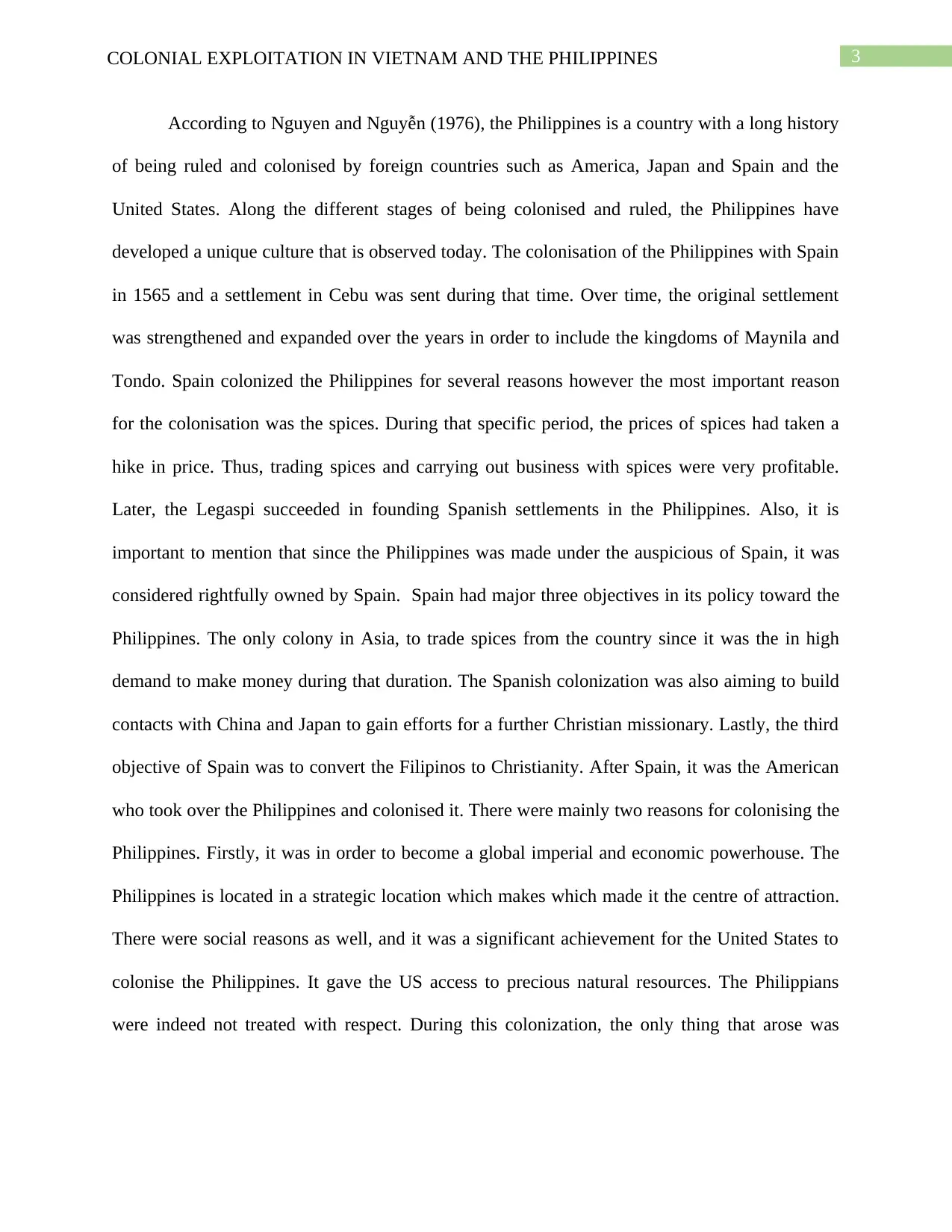
3COLONIAL EXPLOITATION IN VIETNAM AND THE PHILIPPINES
According to Nguyen and Nguyễn (1976), the Philippines is a country with a long history
of being ruled and colonised by foreign countries such as America, Japan and Spain and the
United States. Along the different stages of being colonised and ruled, the Philippines have
developed a unique culture that is observed today. The colonisation of the Philippines with Spain
in 1565 and a settlement in Cebu was sent during that time. Over time, the original settlement
was strengthened and expanded over the years in order to include the kingdoms of Maynila and
Tondo. Spain colonized the Philippines for several reasons however the most important reason
for the colonisation was the spices. During that specific period, the prices of spices had taken a
hike in price. Thus, trading spices and carrying out business with spices were very profitable.
Later, the Legaspi succeeded in founding Spanish settlements in the Philippines. Also, it is
important to mention that since the Philippines was made under the auspicious of Spain, it was
considered rightfully owned by Spain. Spain had major three objectives in its policy toward the
Philippines. The only colony in Asia, to trade spices from the country since it was the in high
demand to make money during that duration. The Spanish colonization was also aiming to build
contacts with China and Japan to gain efforts for a further Christian missionary. Lastly, the third
objective of Spain was to convert the Filipinos to Christianity. After Spain, it was the American
who took over the Philippines and colonised it. There were mainly two reasons for colonising the
Philippines. Firstly, it was in order to become a global imperial and economic powerhouse. The
Philippines is located in a strategic location which makes which made it the centre of attraction.
There were social reasons as well, and it was a significant achievement for the United States to
colonise the Philippines. It gave the US access to precious natural resources. The Philippians
were indeed not treated with respect. During this colonization, the only thing that arose was
According to Nguyen and Nguyễn (1976), the Philippines is a country with a long history
of being ruled and colonised by foreign countries such as America, Japan and Spain and the
United States. Along the different stages of being colonised and ruled, the Philippines have
developed a unique culture that is observed today. The colonisation of the Philippines with Spain
in 1565 and a settlement in Cebu was sent during that time. Over time, the original settlement
was strengthened and expanded over the years in order to include the kingdoms of Maynila and
Tondo. Spain colonized the Philippines for several reasons however the most important reason
for the colonisation was the spices. During that specific period, the prices of spices had taken a
hike in price. Thus, trading spices and carrying out business with spices were very profitable.
Later, the Legaspi succeeded in founding Spanish settlements in the Philippines. Also, it is
important to mention that since the Philippines was made under the auspicious of Spain, it was
considered rightfully owned by Spain. Spain had major three objectives in its policy toward the
Philippines. The only colony in Asia, to trade spices from the country since it was the in high
demand to make money during that duration. The Spanish colonization was also aiming to build
contacts with China and Japan to gain efforts for a further Christian missionary. Lastly, the third
objective of Spain was to convert the Filipinos to Christianity. After Spain, it was the American
who took over the Philippines and colonised it. There were mainly two reasons for colonising the
Philippines. Firstly, it was in order to become a global imperial and economic powerhouse. The
Philippines is located in a strategic location which makes which made it the centre of attraction.
There were social reasons as well, and it was a significant achievement for the United States to
colonise the Philippines. It gave the US access to precious natural resources. The Philippians
were indeed not treated with respect. During this colonization, the only thing that arose was
Paraphrase This Document
Need a fresh take? Get an instant paraphrase of this document with our AI Paraphraser
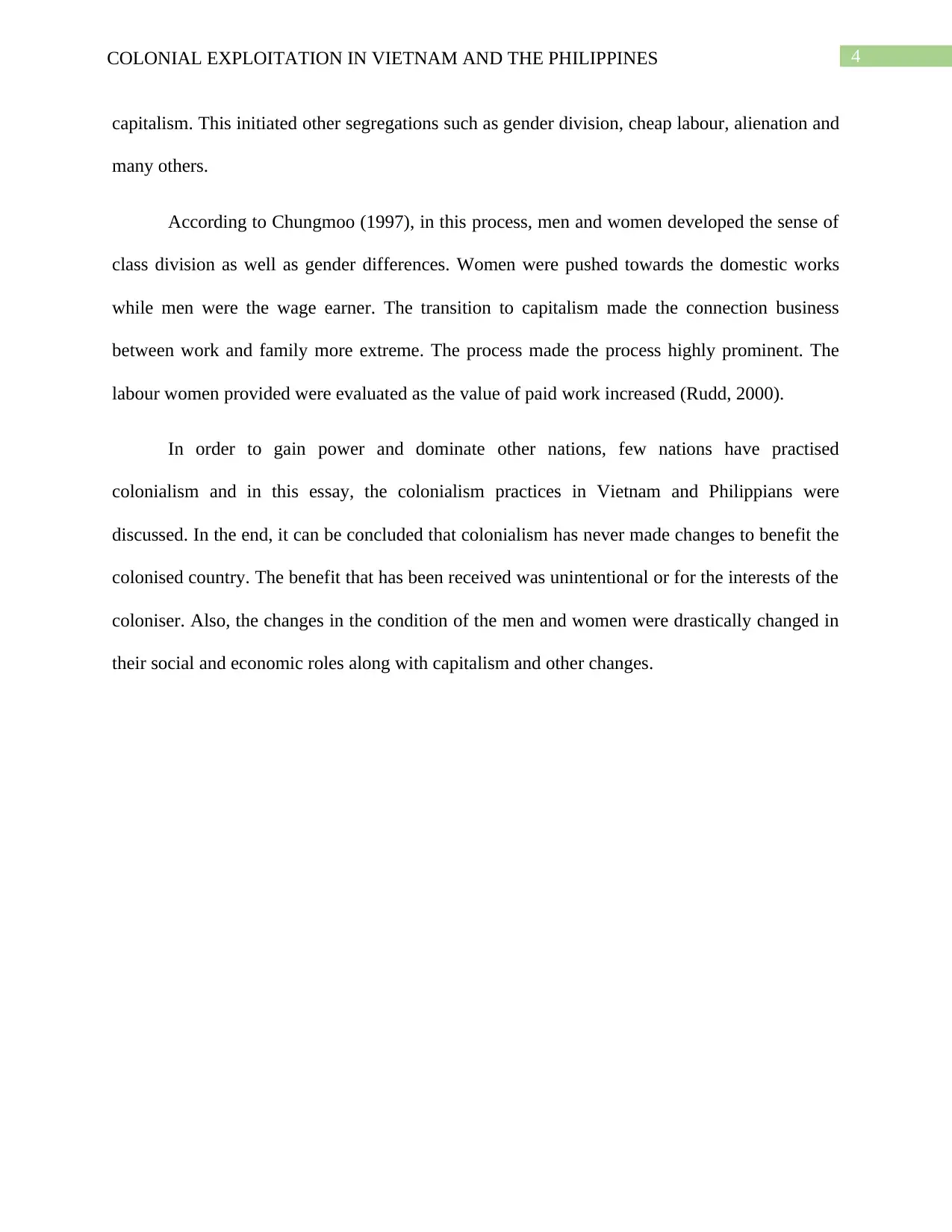
4COLONIAL EXPLOITATION IN VIETNAM AND THE PHILIPPINES
capitalism. This initiated other segregations such as gender division, cheap labour, alienation and
many others.
According to Chungmoo (1997), in this process, men and women developed the sense of
class division as well as gender differences. Women were pushed towards the domestic works
while men were the wage earner. The transition to capitalism made the connection business
between work and family more extreme. The process made the process highly prominent. The
labour women provided were evaluated as the value of paid work increased (Rudd, 2000).
In order to gain power and dominate other nations, few nations have practised
colonialism and in this essay, the colonialism practices in Vietnam and Philippians were
discussed. In the end, it can be concluded that colonialism has never made changes to benefit the
colonised country. The benefit that has been received was unintentional or for the interests of the
coloniser. Also, the changes in the condition of the men and women were drastically changed in
their social and economic roles along with capitalism and other changes.
capitalism. This initiated other segregations such as gender division, cheap labour, alienation and
many others.
According to Chungmoo (1997), in this process, men and women developed the sense of
class division as well as gender differences. Women were pushed towards the domestic works
while men were the wage earner. The transition to capitalism made the connection business
between work and family more extreme. The process made the process highly prominent. The
labour women provided were evaluated as the value of paid work increased (Rudd, 2000).
In order to gain power and dominate other nations, few nations have practised
colonialism and in this essay, the colonialism practices in Vietnam and Philippians were
discussed. In the end, it can be concluded that colonialism has never made changes to benefit the
colonised country. The benefit that has been received was unintentional or for the interests of the
coloniser. Also, the changes in the condition of the men and women were drastically changed in
their social and economic roles along with capitalism and other changes.
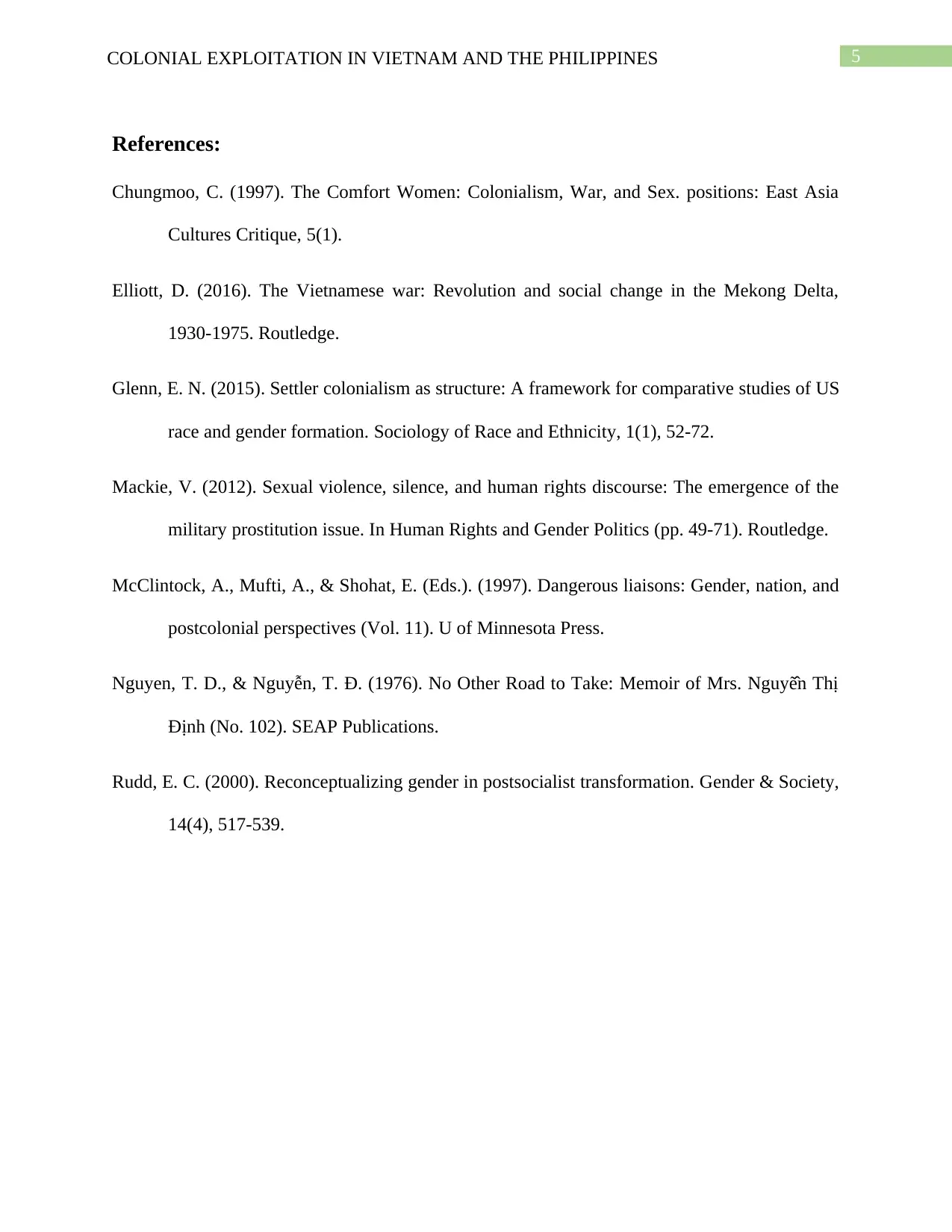
5COLONIAL EXPLOITATION IN VIETNAM AND THE PHILIPPINES
References:
Chungmoo, C. (1997). The Comfort Women: Colonialism, War, and Sex. positions: East Asia
Cultures Critique, 5(1).
Elliott, D. (2016). The Vietnamese war: Revolution and social change in the Mekong Delta,
1930-1975. Routledge.
Glenn, E. N. (2015). Settler colonialism as structure: A framework for comparative studies of US
race and gender formation. Sociology of Race and Ethnicity, 1(1), 52-72.
Mackie, V. (2012). Sexual violence, silence, and human rights discourse: The emergence of the
military prostitution issue. In Human Rights and Gender Politics (pp. 49-71). Routledge.
McClintock, A., Mufti, A., & Shohat, E. (Eds.). (1997). Dangerous liaisons: Gender, nation, and
postcolonial perspectives (Vol. 11). U of Minnesota Press.
Nguyen, T. D., & Nguyễn, T. Đ. (1976). No Other Road to Take: Memoir of Mrs. Nguyẽ̂n Thị
Định (No. 102). SEAP Publications.
Rudd, E. C. (2000). Reconceptualizing gender in postsocialist transformation. Gender & Society,
14(4), 517-539.
References:
Chungmoo, C. (1997). The Comfort Women: Colonialism, War, and Sex. positions: East Asia
Cultures Critique, 5(1).
Elliott, D. (2016). The Vietnamese war: Revolution and social change in the Mekong Delta,
1930-1975. Routledge.
Glenn, E. N. (2015). Settler colonialism as structure: A framework for comparative studies of US
race and gender formation. Sociology of Race and Ethnicity, 1(1), 52-72.
Mackie, V. (2012). Sexual violence, silence, and human rights discourse: The emergence of the
military prostitution issue. In Human Rights and Gender Politics (pp. 49-71). Routledge.
McClintock, A., Mufti, A., & Shohat, E. (Eds.). (1997). Dangerous liaisons: Gender, nation, and
postcolonial perspectives (Vol. 11). U of Minnesota Press.
Nguyen, T. D., & Nguyễn, T. Đ. (1976). No Other Road to Take: Memoir of Mrs. Nguyẽ̂n Thị
Định (No. 102). SEAP Publications.
Rudd, E. C. (2000). Reconceptualizing gender in postsocialist transformation. Gender & Society,
14(4), 517-539.
⊘ This is a preview!⊘
Do you want full access?
Subscribe today to unlock all pages.

Trusted by 1+ million students worldwide
1 out of 6
Related Documents
Your All-in-One AI-Powered Toolkit for Academic Success.
+13062052269
info@desklib.com
Available 24*7 on WhatsApp / Email
![[object Object]](/_next/static/media/star-bottom.7253800d.svg)
Unlock your academic potential
Copyright © 2020–2026 A2Z Services. All Rights Reserved. Developed and managed by ZUCOL.



